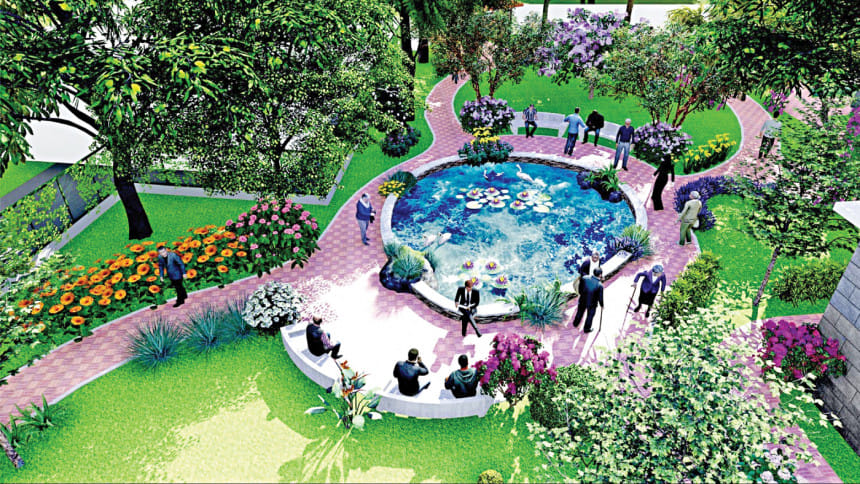A new era in elderly care

Dr Asha Islam Nayeem, a professor in the Department of History at the Dhaka University, has a heart-wrenching story.
Her father, Professor Sirajul Islam, an eminent historian and the chief editor of the national encyclopaedia of Bangladesh, Banglapedia, is suffering from dementia. A neurological anomaly that not only robs you of your memory but makes simple everyday tasks like brushing your teeth or using the bathroom a difficulty; simply because you cannot remember the reflexes.
In one of her articles, Dr Asha Islam Nayeem writes:
"My father has lost all sense of time and space. He lives in a lonely and scary world of hallucinations. He keeps looking for his parents, not believing us when we tell him that an 85-year-old person can't have living parents. We must keep the front door of our apartment always locked from the inside because dementia patients tend to slip out of the house to go looking for his/her parents, ending up getting lost.

Dementia is a very tricky disease to detect, especially if the person has always been forgetful. That is probably why my father's dementia was detected very late. He always had been the absent-minded professor, always losing his glasses, wallet, pens, umbrellas, etc. That is why when he used to keep asking the same question repeatedly, forgetting appointments, what medicines he took, forgetting names, we thought it was because he was aging."
Hers is not the only story that relates to such a sad reality. Taking care of your elderly parents is something we are all struggling with currently. You will often come across advertisements, notices, or Facebook posts of people desperately looking for their mother or father, who has lost their way home and doesn't know who he or she is.
In this race to earn enough for our families, we are compromised when it comes to taking care of our aging parents, let alone giving them the dignified life they deserve at the golden end of their lives.
It is the truth; taking your parents for their cataract operation, getting them hearing aids, assuring them they still look good after having to take out their front tooth, aiding them with walkers- caring for your ailing parent is a full-time job. There are multiple responsibilities if they need hospice care. On top of this crucial responsibility, you simultaneously, have your full-time office to ensure financial stability, the job of being a parent, and the chore of running a household. This kind of life is just plain taxing and responsibility fatigue seeps in.
There is no harm in allowing specialised geriatric care homes to help you tackle this situation better. We need to learn to accept that in modern metropolitan life, retirement homes are a requirement."

COMPREHENSIVE HEALTHCARE HOME FOR SENIOR CITIZENS
After graduating from Dhaka Medical College, Dr Sarder A Nayeem went to Tokyo University to obtain a higher degree in the surgical department. There he developed some precious friendships and lifelong relationships with his professors and mentors and learned to value the need for basic care.
"One of the most fascinating aspects of Japanese culture, which moved and touched me, is the way they take care of the elderly population. All of us know that Japan is the forerunner in the field of geriatric, ie, elderly healthcare, and living in Japan for five and half years I could see the beauty of it," says Professor Nayeem, chairman of Japan Bangladesh Friendship Hospital (JBFH) and Japan Bangladesh Friendship Retirement Homes (JBFRH).
Thus, he sowed the seed of establishing a Japanese-standard comprehensive geriatric healthcare facility in Bangladesh, the result of which is JBFRH in Rupganj upazila.
It is a smooth ride till the absolute end of the 300-foot road in Purbachal you take a turn under the Kanchan bridge, a straight drive from there would take to JBFRH in 15 minutes or so. This easily accessible facility is the first-ever comprehensive healthcare home, where you can avail yourself of all kinds of geriatric healthcare and treatment facilities for senior citizens in Bangladesh with a modern living concept. Hospice care or end-of-life care is a unique and essential part of this project.
"Chasing my dream for the elderly care home project, I started with just buying the first small piece of land 12 years back and unconditionally my friends and partners came forward to make this project a huge success despite the social and cultural taboo against the old-age home in our society," Sarder says.
JBFRH has 232 state-of-the-art studio apartments that are designed to create a gated community that prioritises safety, convenience, and social engagement for the country's aging population.

SPECIALISED AND TAILORED CARE
There are times when family members are not aware of the specialised kind of care the elderlies need especially those suffering from dementia or are terminally ill. JBFRH offers need-based on-site healthcare services through a complete geriatric hospital set-up. Besides routine medical check-ups, they have skilled nursing staff and professional caregivers to offer specialised care, including dementia care or palliative care, ensuring that every patient receives the appropriate and right level of medical attention they require.
"For residents requiring end-of-life care, we offer a compassionate approach that focuses on comfort, dignity, and peace. And our palliative care services are also designed to support both the individual and their loved ones during this sensitive time," says Dr Sarder adding that they have special moveable medical beds that can be taken out to the roof garden for them to enjoy nature.
The facility offers essential services concerning mobility aids, assistive technologies, on-site medical services, personalised meal plans, fitness and mental wellness resources, and opportunities for social activities and offers personalised meal plans prepared by nutritionists and professional chefs.
"Spiritual and cultural well-being is integral to the facility's mission, providing spaces for personal reflection, meditation, and religious practices," says Dr SAM Ashik-Ur-Rahman, director (coordination), Japan Bangladesh Friendship Retirement Homes & Foundation.

Designed to provide cosy and accessible living spaces whether in studio apartments or in palliative care, terminal care, and hospice facilities, all their accommodations are equipped with essential amenities.
"Meals are tailored to individual preferences or medical requirements, such as low sodium, diabetic-friendly, or gluten-free diets in our room service, restaurants, and coffee shops," says Dr Rahman.
This centre is not any regimented place instead special focus is given to recreational and social activities designed to stimulate both the mind and body. They encourage socialisation to combat isolation and also allow residents the opportunity to remain active and engaged in their daily lives. This five-star resort-like elderly home has fitness classes, a library, movie theatres, indoor games, interactive sessions, river cruises, arts and crafts workshops, gardening, music sessions, group outings, and celebrations of special events.

Quoting Dr Asha Islam Nayeem:
"It is a blessing that the JBFRH is about to begin its journey. Professor Sirajul Islam is going to be one of the first residents of this institute. My father doesn't have to be locked in his apartment anymore. Because it is a gated community, my father can safely leave his room and roam around the grounds. He can overcome his depression as he will find people of his generation to talk to.
He can enjoy everything that I am unable to provide him now like exercise facilities, outdoor excursions, round-the-clock assistance, and, most of all, comradeship. My father's senses are most calm when he is surrounded by caring people. Locked up in my apartment, my father is living a lonely and depressing life, whereas, at JBFRH, he will have the freedom of movement, something that every human being craves and deserves to have.

The more such facilities develop, the faster we can overcome the cultural inhibitions that we have towards retirement homes or old homes as they are commonly called."
On that note, try and acknowledge the fact that sending your loved ones to one such healthcare facility is not signing their death sentences. Rather, it is giving them a chance to live with dignity in a supervised facility despite their old age complications; a chance you cannot give, even if you can afford the best medical attention.

 For all latest news, follow The Daily Star's Google News channel.
For all latest news, follow The Daily Star's Google News channel. 





Comments